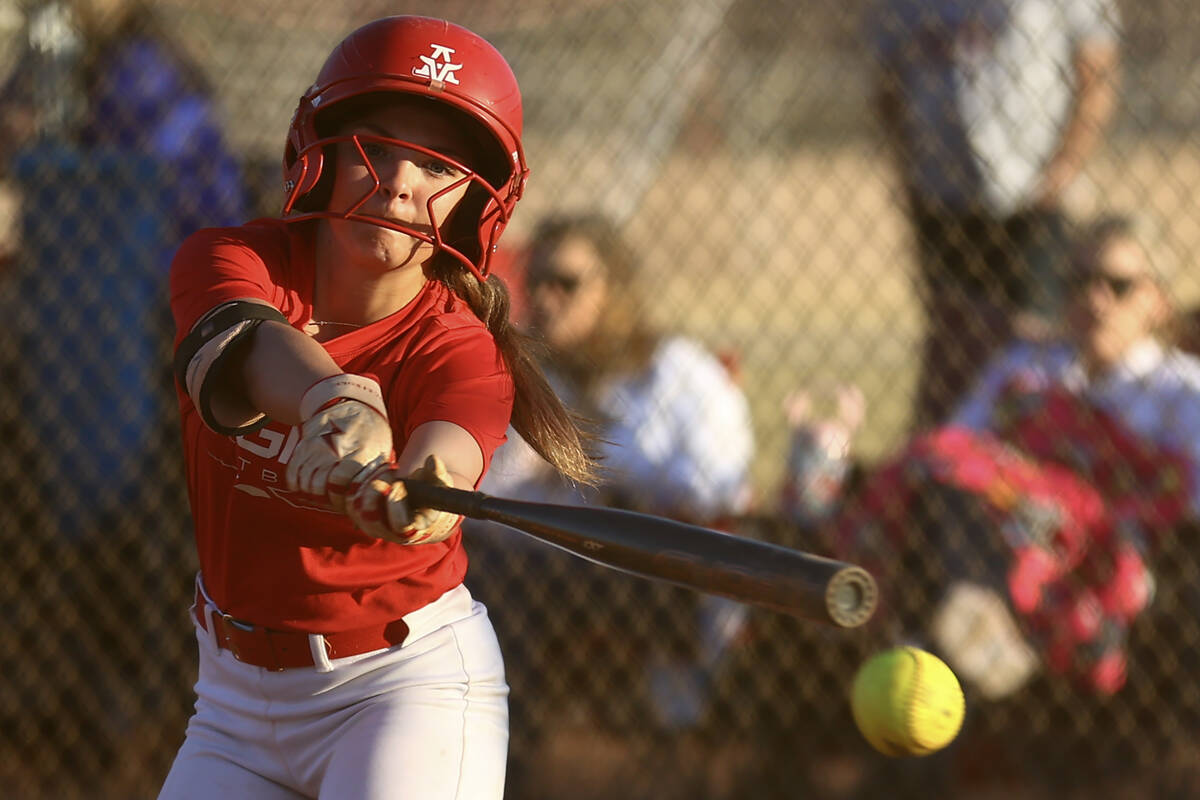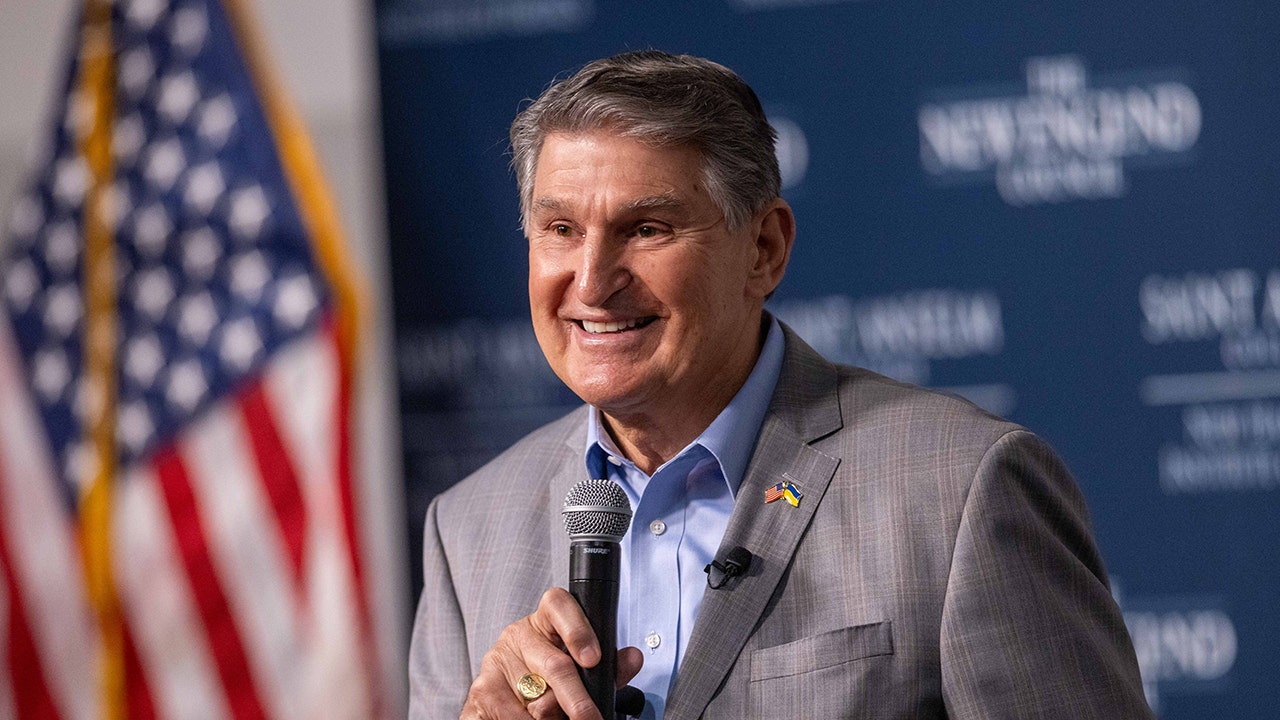Nevada
Nevada Preps Girls Athlete of the Week: Arbor View’s Breya Hee

Arbor View softball senior outfielder Breya Hee said the team has become more connected in recent weeks.
Winning helps with that.
The Aggies are on a four-game winning streak entering Tuesday and Hee has played a big role in it.
She went 3-for-4 with a double and six RBIs to help Arbor View defeat Green Valley 15-0 on April 24. She was named Nevada Preps Girls Athlete of the Week for her efforts.
“I was just trying to focus on bringing whatever I could, doing whatever I can to help the team win the game,” Hee said. “Whatever the weak spots were is where I tried to hit it.”
Let’s get to know this week’s girls athlete of the week. (Note: Answers have been edited for clarity and length.)
Nevada Preps: Who’s a softball player you look up to and try to model your game after?
Hee: My favorite softball player is Aliyah Andrews. She used to play at Louisiana State. She is an amazing outfielder. She’s spectacular. She flies everywhere. Her slapping is incredible. When I find drills, it’s always from her.
NP: If you weren’t playing softball, what sport would you be playing?
Hee: I’d probably be playing soccer or volleyball. I like soccer because it’s outside. And volleyball, it’s just a sport that I’d have an interest in. I used to play soccer when I was 6-years-old, but then I moved to softball.
NP: Do you have any pregame rituals or game-day superstitions that you follow?
Hee: I always put my left sock on first. And I always have to listen to “Hit ‘Em Up” by Tupac (Shakur) before a game. I have a pregame playlist, all the songs that get me hyped and ready. And I always try to eat some sugar so I have a lot of energy before the game.
NP: What’s been your favorite memory in your softball playing career thus far?
Hee: Playing in the Colorado Sparklers or any of the tournaments I’ve been in, it’s an amazing experience. Recently, this past Faith Lutheran win we had (on April 17). We were in the top of the seventh inning and we were down by two runs and my hit to center field brought in two runs.
Contact Alex Wright at awright@reviewjournal.com. Follow @AlexWright1028 on X.

Nevada
High school seniors graduate with credit from the University of Nevada Reno’s Collegiate Academy

RENO, Nev. (KOLO) – 300 seniors from various Northern Nevada schools graduated with college credit from UNR’s Collegiate Academy.
The Collegiate Academy program implements current University of Nevada, Reno curriculum and coursework in high school classrooms, and all for only $25 per class. College faculty work with high school teachers, meeting regularly to plan lessons, review coursework, and provide guidance. The result is a course that leverages both the content expertise of University faculty with the instructional expertise of the high school teachers. 26 UNR courses were offered this year across subjects in English, mathematics, economics, psychology, world languages, political science, chemistry and others.
On Monday evening high school students got the chance to walk across a college stage to celebrate their hard work as their ceremony was held on the UNR campus. Those college credits can of course, be used at UNR but also at any university across the nation. KOLO 8 spoke with Ale Ibarra, one of the seniors in attendance, who said the program not only made college cheaper, but gave her a more personalized experience.
“My class had 25 or 30 kids maximum. If I had a a problem or a question I could go at any point in the day and ask my teacher. It was just a lot more personal versus what I expect to get in college,” Ibarra said.
Statewide, 29 schools participated in the program this year with more than 4,500 students enrolled during the spring semester.
Copyright 2024 KOLO. All rights reserved.
Nevada
Nevada abortion-rights measure has enough signatures for November ballot, supporters say

LAS VEGAS — Abortion access advocates in Nevada said Monday that they have submitted almost twice the number of petition signatures needed to qualify a measure for the November ballot that would enshrine reproductive rights in the state constitution.
Supporters collected and submitted more than 200,000 signatures, Nevadans for Reproductive Freedom President Lindsey Harmon told reporters. Proponents need 102,000 valid signatures by June 26 to qualify for the ballot.
“The majority of Nevadans agree that the government should stay out of their personal and private decisions … about our bodies, our lives and our futures,” Harmon said at a rally with about 25 supporters outside the Clark County Government Center in Las Vegas.
Elections officials in Nevada’s 17 counties still must verify signatures and it’s not clear how long that will take.
In Washoe County, spokeswoman Bethany Drysdale said advocates delivered several boxes of signatures to the registrar’s office in Reno. Boxes also went to officials in Clark County, the state’s most populous and Democratic-leaning area, which includes Las Vegas.
Nevada voters approved a law in 1990 that makes abortion available up to 24 weeks of pregnancy, a point considered a marker of fetal viability. But Nevada is one of several states where backers are pressing to strengthen abortion access after the U.S. Supreme Court overturned Roe v. Wade.
Since then, several Republican-controlled states have tightened abortion restrictions or imposed outright bans. Fourteen states currently ban abortions at all stages of pregnancy, while 25 allow abortions up to 24 weeks or later, with limited exceptions.
People hold signs during a news conference by Nevadans for Reproductive Freedom, Monday, May 20, 2024, in Las Vegas. Abortion access advocates in Nevada said Monday they’ve submitted twice the number of petition signatures needed to qualify for a ballot measure aimed at enshrining what they term reproductive rights in the state constitution. Credit: AP/John Locher
Harmon said the effort to collect signatures was “very expensive” but declined to give an exact figure. She noted that the neighboring states of Idaho, Arizona and Utah have stricter abortion rules than Nevada.
Most states with Democratic legislatures have laws or executive orders protecting access. Voters in California, Kansas, Kentucky, Michigan, Montana, Ohio and Vermont have sided with abortion rights supporters on ballot measures. Supporters of abortion rights have qualified measures for ballots in Colorado and South Dakota, and Nevada is among nine other states where signature drives have been underway.
The measure would ensure “a fundamental, individual right to abortion” while allowing Nevada to regulate “provision of abortion after fetal viability … except where necessary to protect the life or health of the pregnant individual.”
Melissa Clement, Nevada Right to Life director, told The Associated Press her organization will continue to fight the proposed amendment in courts and at the ballot box.
People hold signs during a news conference by Nevadans for Reproductive Freedom, Monday, May 20, 2024, in Las Vegas. Abortion access advocates in Nevada said Monday they’ve submitted twice the number of petition signatures needed to qualify for a ballot measure aimed at enshrining what they term reproductive rights in the state constitution. Credit: AP/John Locher

“As a woman, nothing makes me angrier than Democrats taking one of the most difficult and traumatic decisions a woman can make and using it for political fodder,” Clement said. “Scaring women. It’s despicable.”
Signature-gathering is one of two tracks being taken in Nevada to get the measure on the ballot.
To amend the Nevada Constitution, voters must approve a measure twice. If the abortion amendment qualifies and is approved by voters this year, they would vote on it again in 2026.
In the Legislature, Nevada’s Democratic-majority lawmakers passed a 24-week right-to-abortion measure last year along party lines, teeing the issue up for another vote when lawmakers return next year for their next every-two-years session in Carson City. If approved then, the proposed constitutional amendment would be put on the 2026 statewide ballot.
Nevada
Walker River Tribe gets final $2.4M needed for clean water infrastructure project • Nevada Current

For years, members of the Walker River Paiute Tribe who depend on well water have been plagued by water scarcity, brought on by a lack of infrastructure and funding.
Between aging pipes, pollutants and regional drought, the tribe’s existing water infrastructure has been stretched to its limits — compromising both public health and economic development.
But after seven years of lobbying, the Walker River Paiute Tribe now has the funding it needs for a $12 million water system improvement project to secure a reliable and sustainable water supply for well users on the tribe’s reservation.
In total, the project will provide a comprehensive domestic water supply distribution system for more than 100 residences on the reservation.
Andrea Martinez, the chair of the Walker River Paiute Tribe, said the tribe hopes to complete the project in a little over two years. The project will secure clean drinking water, and expand the tribe’s capacity to add new homes on the reservation.
“This has been a priority for the tribe for years. And we’re fortunate to get funding for this project. It’s really humbling to see this come to fruition. It gives me hope for the next generations of our tribe,” Martinez said.
Last week, the Department of the Interior awarded the Walker River Paiute Tribe more than $2.4 million to construct a domestic water supply for communities solely dependent on well water.
That funding builds on a $5.2 million U.S Department of Commerce economic development grant to the tribe in 2023, a $1 million U.S. Environmental Protection Agency grant for water quality improvements, and $3 million in drinking water state revolving loan funds. The remaining funds would be covered by the additional American Rescue Plan funding awarded to the tribe.
The $2.4 million grant awarded last week will be used to construct a 410,000-gallon water storage tank on the Walker River Paiute Reservation for the project, which will include about 25,000 feet of pipe across the reservation, and a new water line needed to construct housing.
“We’re going to be able to bring our people back home by having this water infrastructure and building out homes. Ultimately, I think that’s going to help our tribe continue to grow and succeed and be fruitful in the future,” Martinez said. “I think once we have the water infrastructure, we’ll be able to see our vision.”
‘Coming back home’
Nevada has 21 federally recognized tribes that span 28 reservations, bands, colonies and community councils. Most reservations in Nevada are remote and face a host of challenges unique to rural communities, including lack of infrastructure, inadequate water treatment facilities, and limited funding.
Tribes in rural Nevada are highly vulnerable to water insecurity because of a lack of access to water infrastructure stemming from policy decisions made in the early days of federal agencies such as the Bureau of Reclamation.
Many homes that rely on well water don’t have adequate water pressure for home use, leaving residents with unreliable water access. A report by the Indian Health Service in 2019 noted that low water pressure in Walker River Paiute Tribe housing has led to health risks associated with bacteria growth in stagnant water.
Improvements to water infrastructure can reduce inpatient and outpatient visits related to respiratory, skin and soft tissue, and gastroenteric disease, according to IHS. Based on 2020 data, every $1 spent on water and sewer infrastructure can save $1.18 in avoided direct health care costs for these diseases.
Lack of adequate water pressure on the reservation also means that much of the reservation lacks the water pressure needed for piping fire hydrants, putting the tribe at severe risk of fire damage. Existing water storage capacity on the reservation falls short of meeting current codes for fire suppression, according to the Interior.
“It could have been detrimental to our community if there were fires in areas that didn’t have adequate water pressure,” Martinez said.
Lack of water infrastructure has cost the tribe, both in terms of public health and economic development, said Martinez.
“I think that’s probably one of the fundamental contributors to why we can’t have people come back home and work for the tribe. We talk about leaving the reservation, getting educated, coming back home to help your people and make something better for the tribe. But ultimately, what I have witnessed is that there are no homes for these individuals to come home to,” she said.
A number of current tribal employees are forced to live off the reservation despite a desire to return, due to lack of housing and the necessary infrastructure needed to support those homes, said Martinez.
“It’s just so sad and detrimental to see,” she continued.
The funding for water infrastructure is a huge game changer for the tribe, and will allow the tribe to build more homes and businesses, said Martinez. The tribe is also wrapping up a $1 million water rights settlement with the Bureau of Reclamation that will secure the tribe’s water rights to the Weber Reservoir, and recognize the tribe’s jurisdiction over groundwater on their reservation.
“This is considered a historical settlement for the tribe. I believe it’s been over 100 years that we’ve been fighting for our water,” Martinez said.
Once the water infrastructure project is complete, the tribe can utilize those hard-fought water rights for the tribe’s benefit, she said.
“We can continue to build capacity and become successful, but also build cultural preservation. If we have more citizens living on the reservation there could be a stronger sense of cultural preservation and connection to our traditions and heritage.”
The funding for the $2.4 million grant will come from the Inflation Reduction Act passed by Congress in 2022. In total, the Department of the Interior announced $147.6 million in funding for 42 drought resilience projects in ten states last week.
In a statement announcing the funding, Secretary of the Interior Deb Haaland applauded the Biden administration for “making record investments to safeguard local water supplies and build climate resilience now and into the future.”
“By working together in close coordination with states, Tribes and other stakeholders, we can provide much needed relief for communities across the West that will have a lasting impact for generations,” Haaland said.
-

 News1 week ago
News1 week agoSkeletal remains found almost 40 years ago identified as woman who disappeared in 1968
-

 Movie Reviews1 week ago
Movie Reviews1 week ago“Kingdom of the Planet of the Apes”: Disney's New Kingdom is Far From Magical (Movie Review)
-

 World1 week ago
World1 week agoIndia Lok Sabha election 2024 Phase 4: Who votes and what’s at stake?
-

 World1 week ago
World1 week agoUkraine’s military chief admits ‘difficult situation’ in Kharkiv region
-

 World1 week ago
World1 week agoCatalans vote in crucial regional election for the separatist movement
-

 Politics1 week ago
Politics1 week agoNorth Dakota gov, former presidential candidate Doug Burgum front and center at Trump New Jersey rally
-

 Movie Reviews1 week ago
Movie Reviews1 week agoAavesham Movie Review
-

 News1 week ago
News1 week agoTrump, Reciting Songs And Praising Cannibals, Draws Yawns And Raises Eyebrows















